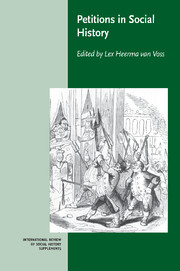Book contents
- Frontmatter
- Contents
- NOTES ON CONTRIBUTORS
- Introduction
- Voices from Among the “Silent Masses”: Humble Petitions and Social Conflicts in Early Modern Central Europe
- Supplications between Politics and Justice: The Northern and Central Italian States in the Early Modern Age
- The Power of Petitions: Women and the New Hampshire Provincial Government, 1695–1700
- Officially Solicited Petitions: The Cahiers de Doléances as a Historical Source
- Revolt, Testimony, Petition: Artisanal Protests in Colonial Andhra
- Deference and Defiance: The Changing Nature of Petitioning in British Naval Dockyards
- Petitions and the Social Context of Political Mobilization in the Revolution of 1848/49: A Microhistorical Actor-Centered Network Analysis
- The Image of Jews in Byelorussia: Petitions as a Source for Popular Consciousness in the Early Twentieth Century
- “Begging the Sages of the Party-State”: Citizenship and Government in Transition in Nationalist China, 1927–1937
- Private Matters: Family and Race and the Post-World-War-II Translation of “American”
Supplications between Politics and Justice: The Northern and Central Italian States in the Early Modern Age
Published online by Cambridge University Press: 04 August 2010
- Frontmatter
- Contents
- NOTES ON CONTRIBUTORS
- Introduction
- Voices from Among the “Silent Masses”: Humble Petitions and Social Conflicts in Early Modern Central Europe
- Supplications between Politics and Justice: The Northern and Central Italian States in the Early Modern Age
- The Power of Petitions: Women and the New Hampshire Provincial Government, 1695–1700
- Officially Solicited Petitions: The Cahiers de Doléances as a Historical Source
- Revolt, Testimony, Petition: Artisanal Protests in Colonial Andhra
- Deference and Defiance: The Changing Nature of Petitioning in British Naval Dockyards
- Petitions and the Social Context of Political Mobilization in the Revolution of 1848/49: A Microhistorical Actor-Centered Network Analysis
- The Image of Jews in Byelorussia: Petitions as a Source for Popular Consciousness in the Early Twentieth Century
- “Begging the Sages of the Party-State”: Citizenship and Government in Transition in Nationalist China, 1927–1937
- Private Matters: Family and Race and the Post-World-War-II Translation of “American”
Summary
“Those who think to do away with petitions would overthrow the entire system of the State”. This remark – taken from an anonymous eighteenth-century account of the political organization of the Duchy of Parma and Piacenza – describes well the importance attributed to complaints in the organization of the state. Through complaints, or petitions, it is generally possible to verify a number of fundamental forms and modes of communication between society and the institutions of the ancien regime, and to reconstruct the procedures of mediation, repression, acceptance, and agreement adopted by princes, sovereigns, or magistracies in response to social demands.
Petitions are potentially very flexible instruments and pervade every aspect of social, institutional, administrative, and judiciary life. “Petitioning” refers to different concepts of authority and sovereignty as well as to specific power relations between rulers and those ruled. For this reason, it becomes necessary to take a close look at the relations and differences between various uses of petitions – both from the point of view of the petitioners and from the point of view of the answers provided by the institutions. On the other hand, the term “supplication” will be used in its most general meaning with reference to letters (or documentation) which single citizens, or organized and recognized groups, sent to the state authorities requesting grace, favours, privileges, or calling attention to injustices and abuses. These documents gave rise to legal proceedings, administrative acts that led to proceedings in tribunals, magistracies, and chancelleries.
- Type
- Chapter
- Information
- Petitions in Social History , pp. 35 - 56Publisher: Cambridge University PressPrint publication year: 2002
- 13
- Cited by

